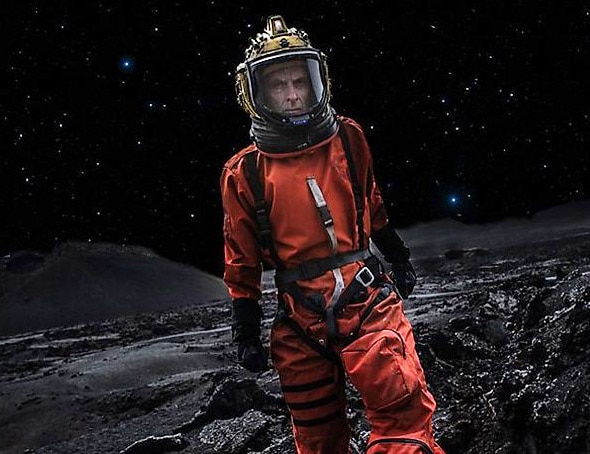Create a free profile to get unlimited access to exclusive videos, sweepstakes, and more!
Slate Plus Doctor Who Podcast Episode 7: “Kill the Moon”

Because I love both Slate and Doctor Who, I’m pleased to let y’all know that the seventh installment of our Slate Plus Doctor Who podcast is now online, wherein I, along with writers and Whovians Gabe Roth and Mac Rogers, discuss the latest episode “Kill the Moon”.
You can go ahead and listen to it to get our spoilerrific opinions on the episode. However, I did have a pretty big issue with the show, but the podcast itself wasn’t long enough for me to dive into it; I wanted to cover more of the overarching themes than nitpick during the ‘cast.
But I have this here blog, so I’m going to nitpick. It’s about the science, so: SPOILERS HO.
Before I get started, let me preface this with a statement: I love Doctor Who. I always have. I take it for what it is: a story, a sometimes silly story, a sometimes profound story, a sometimes funny, goofy, serious, beautiful allegorical story. So please don’t attack me about how I hate the show, or am now a traitor, or whatever. I’m usually quite happy to overlook the spinning, folding, and mutilating of science in the service of Doctor Who plot, but I have a point to what follows; it’s not just nerdgassing (well, it is nerdgassing, but it's not just nerdgassing). Bear with me.
The biggest problem I had with this episode is that the science mistakes were so egregious and so obvious that they kept pulling me right out of the story. I know not everyone will know the science that well, and perhaps I’m being too hard.
But the thing is, a lot of the mistakes were fixable with a simple Google search.
For example, more than once the Doctor mentions that the Moon is 100 million years old. In reality, the Moon formed not long after the Earth did, certainly less than 100 million years after it. That makes the Moon something like 4.5 billion years old … a lot more than 100 million. I suspect the writers just got mixed up, but still, it was irritating.
If you want to retcon it, you could say that perhaps the creature’s gestation period is 100 million years, so this cycle repeats, and the Moon we have today is the 45th or so in a long line of them. But then the Doctor would have had to know that, and it didn’t seem that he did.
The Moon’s increase in gravity irked me, too. First of all, look at an egg. It’s a sealed, self-contained object, with everything it needs for the embryo inside to grow and hatch. Because of that, once it’s laid, it gains or loses very little mass (ignoring osmosis). If the Moon were to suddenly gain 1.3 billion tons (essentially overnight), where did it come from? The embryo inside an egg grows in mass by consuming what’s in the egg, so the egg’s mass overall stays the same. This magical mass increase bugged me a lot, especially since it was such a key point in the show.
Also, the amount (1.3 billion tons) of mass increase didn’t make sense. The Moon’s mass is about 7 x 1019 tons—50 billion times the mass of the creature! Adding a billion tons to the Moon would be hardly noticeable at all; like having a dust mote land on your head. The gravity of the Moon wouldn’t be affected, whether you were standing on it or on the Earth.
Note too that the creature was about the same size as the Moon itself. If it only had a mass of 1.3 billion tons, then its density would’ve been incredibly low. A cube of air 10 kilometers (6 miles) on a side would have a mass of about a billion tons, yet the creature was clearly thousand of kilometers long.
There was a lot more. Where did all that rest of the Moon go after the creature hatched? (The Doctor said it disintegrated, but the mass would still be there). How did the creature lay a new Moon-egg the same size and mass as before, if it itself was part of the Moon? Why did it have wings if it lives in space? How did no one notice the Moon was different after 2049? And don’t even get me started on the “prokaryotes.”
Any of these science missteps would’ve been irksome, but taken all together they really detracted from the program. And most would’ve been quite easy to fix with just a few minutes of time from someone who knew the numbers. I know, when you watch a time-travel show you’d best put strict scientific accuracy on the back shelf, but since the reboot, Doctor Who has taken some pains to fix a lot of the canon problems ignored in the show’s original run. I’d love to see more of that.
I’m sure that in due time I’ll watch the episode again. Perhaps with some distance I can ignore the scientific mistakes and enjoy the overall plotting better—after all, this was a key episode in the Who mythos; the Doctor has long said the 21st century is when “everything changes,” when mankind finally reaches for the stars (that was also the key phrase of Torchwood, the Doctor Who spinoff). As I watched, it really bugged me that such an important moment in the series was relegated to such a silly plot, especially after a couple of really outstanding episodes this season.
I really like the Missy/Nethersphere arc we’re seeing, as well as a lot of the odd and surprising turns to the Doctor himself (as well as Clara) this season. I really hope they can get back on their game and deliver more of what makes me love this program so.


























